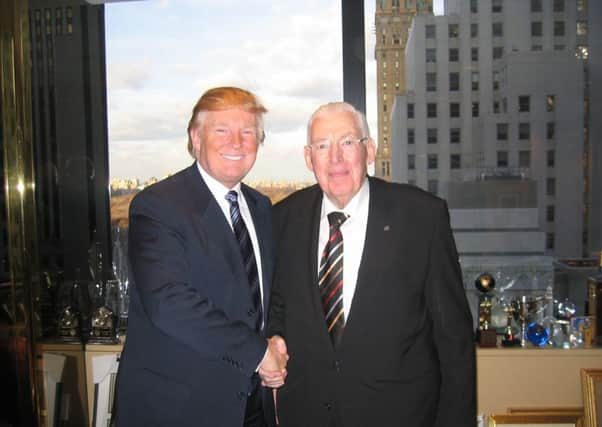Comment: Trump, the secular fundamentalist who, like Paisley, shook establishment


This is a subtle understanding of the one aspect of the depth of the relationship between the US and Ulster which would pass most people by. The same is true of what seems to many to be a very unfamiliar American political system. Is this really true?
In fact there are striking similarities between the meteoric rise of the outsider, Donald Trump, to presidential power and the earlier breakthrough that the late Ian Paisley made into the politics of Ulster, beginning in the late 1960s.
Advertisement
Hide AdAdvertisement
Hide AdStudying Ian Paisley for my PhD at Queen’s, I took time to reflect on the emergence of the fundamentalist and conservative right in the US, of which Jerry Falwell was a prominent leader. I concluded then that it would take someone with very similar characteristics to Paisley to make the breakthrough in American politics.
Historically, American politics have been hard on independents standing outside the well-established two-party system. The calculation was, therefore, that it would take a charismatic figure with colossal drive and determination, such as Ian Paisley had demonstrated, to motivate a mass movement capable of overturning the established political structures – what is called the ‘establishment’.
I was wrong in my estimate that the challenge would come from the American fundamentalist right, because Donald Trump might be characterised more readily as a secular fundamentalist than as a born-again Christian.
Once that caveat is set aside, there is a remarkable degree of similarity between the two men. This secular fundamentalism expresses itself in the offer of simple solutions to complex and engrained social problems; such as inner city black American poverty or poor white unemployment in the “rust-belt”.
Advertisement
Hide AdAdvertisement
Hide AdBoth outsiders appealed to the alienated and the marginalised, while at the same time mobilising many who had never previously voted. Their populism and demagoguery, that facility with the word pictures that ordinary electors can grasp, soon built up a highly-committed political base. Behind the bombast and rhetoric, which has the audience all ears, lies an undercurrent of pragmatism which introduces a level of unpredictability for supporters and opponents alike.
And while a partisan media ridiculed and scorned men with a distasteful message, such criticism cut little ice with ordinary folks who felt that no one knew or cared about their story; a story which they could not articulate for themselves because their lack of education or social status denied them access to the established channels of communication.
One on either side of the Atlantic, Paisley and Trump saw themselves as defenders of a constitutional settlement that was under threat, which is why the appointment of future judges to the American Supreme Court was such an important sub-text in the 2016 Presidential Election.
Another important similarity between both colossal personalities was the need to re-create a political force which stood outside and eventually battered down the established political structures. Paisley made many attempts to create such a force: the Ulster Protestant Volunteers, the Protestant Unionists and eventually the much more openly secularised and broadly-based Democratic Unionist Party. Trump, having less time to spare, created the movement.
Advertisement
Hide AdAdvertisement
Hide AdPaisley’s DUP took many years before it became dominant. Trump now bestrides a much vaster stage, that of a world super-power. Trump’s future lies in the quality of the advice he surrounds himself with and whether he is willing to listen to that advice and embrace criticism. In the end the will to power may out flank both principle and ideology.
The differences in scale are impressive. The United States has a population of 300 million while Northern Ireland has nearly two million; but the mass movement of Ulster-Scots, largely Presbyterian, settlers to the Americas in the 18th Century established factors of kinship, vocabulary, music and what we call ‘values’ that have created intriguing parallels in the political cultures that link a world super-power with this region of the United Kingdom.
• Clifford Smyth was in the DUP before parting company with Ian Paisley in the 1970s. He is the author of ‘Ian Paisley: Voice of Protestant Ulster’.